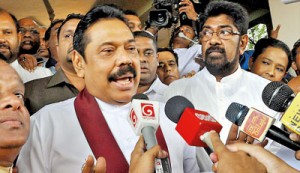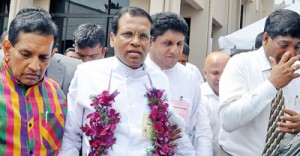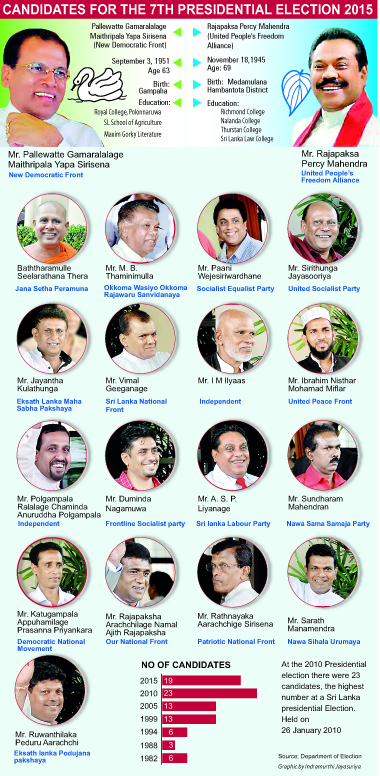News
Candidates bare assets, but polls chief covers them
Elections Commissioner Mahinda Deshapriya has blocked public access to the asset declarations of all presidential candidates till after the January 2015 election.
“The public can request for them after the elections,” the Elections Commissioner told the Sunday Times yesterday. “We are not letting anyone see them till then.” Legal experts said his decision was an administrative move that did not have any basis in law.

Pix by Indika Handuwala
All 19 candidates –including President Mahinda Rajapaksa and the New Democratic Front’s Maithripala Sirisena — have filed their declarations of assets and liabilities with the Elections Department, Mr. Deshapriya said.
It is the first time that every contender for the presidency has complied with the Declaration Assets and Liabilities Act that binds candidates to fill a standard form disclosing their, their spouses’ and children’s properties. The law has only been loosely enforced in the past.
Mr. Sirisena allowed the Sunday Times to see his asset declaration but did not release a copy. He also requested the newspaper not to publish its contents. President Rajapaksa’s office confirmed he has filed his declaration and that anyone could obtain it through the Elections Department.
“Once it is submitted to the Commissioner, it becomes a public document,” said Presidential Spokesman Mohan Samaranayake,. “The President is not seeking cheap publicity by overdoing things and trying to show that he is honest, genuine and so on.”
 But this will now not be possible till after the election because of Mr. Deshapriya’s decision to restrict access.
But this will now not be possible till after the election because of Mr. Deshapriya’s decision to restrict access.
The law allows any person to call for and refer to any declaration of assets and liabilities on the payment of the prescribed fee. On the payment of a further fee, any person shall have the right to obtain a copy of that declaration. There is no mention of a timeframe — such as the one Mr Deshapriya is imposing — within which this is to be done.
“He cannot refuse to entertain a request from a citizen because a person’s access to information under Section 5(3) of the Declaration of Assets and Liabilities Act is clearly described as a right and this is also clearly seen in Section 8,” said Gehan Gunetilleke, Senior Analyst and Head of Law at Verite Research.
But others pointed out that there were justifiable concerns regarding the possible abuse or misuse of such declarations for political gain in the run-up to an election — particularly one as hotly-contested as the January 8 poll.
All declarations are typically submitted in a sealed envelope. Mr. Sirisena, however, set a precedent by saying he would make copies available for the public view. After handing over his nomination on December 8, he said, “I presented my assets declaration to the Elections Commissioner. If there is anyone who wishes to see my assets declaration, it will be at our office from tomorrow. Anyone who wants can look at it. It’s open to all of the people.”
The Sunday Times sought and was granted access to Mr. Sirisena’s declaration forms at his official residence in Wijerama Road, Colombo 7. (He is entitled to occupy that house for a stipulated period from the date of his resignation as Minister of Health). But it was not the simple or straightforward process Mr. Sirisena had implied it would be at his news conference.
He required a “legal” request to be made on a letterhead. He asked for its contents not to be published. He refused to provide a copy. And once it was made available (after several phone calls to active campaign members), this journalist perused the document while being closely flanked and watched by two of his aides.
Authoritative sources from Mr. Sirisena’s campaign said yesterday that he still had no objection to making his declaration widely accessible. “There’s nothing in it,” one divulged. “It had originally been planned to display the document at the party offices.” But Mr Sirisena had later been advised that his desire for transparency might backfire, leaving him vulnerable to political attack.
The Sunday Times contacted 16 of the 19 presidential candidates this week. The majority of them said they had no objection to showing this journalist their declarations of assets and liabilities on a voluntary basis.
These included the Ven. Battaramulle Seelaratana Thera from Jana Setha Peramuna, Paani Wijesiriwardhane from the Socialist Equality Party, M.B. Thaminimulla from Okkoma Wesiyo Okkoma Rajawaru, and Siritunga Jayasooriya from United Socialist Party.
Also willing were Ibrahim Nisthar Mohamad Miflar from United Peace Front, Duminda Nagamuwa from Frontline Socialist Party, Sundharam Mahendran from Nawa Samaja Party, Namal Ajith Rajapaksa from Our National Front and Ruwanthilaka Peduru Arachchi from Eksath Lanka Podujana Pakshaya.
Wimal Geeganage from Sri Lanka National Front and Ratnayake Arachchige Sirisena from Patriotic National Front completed the list. One of the 16 candidates even emailed this journalist a scanned copy of his forms.
The Sunday Times could not contact K.A. Prasanna Priyankara from the Democratic National Movement, Anuruddha Polgampola who is an independent candidate, or Sarath Manamendra from the Nawa Sihala Urumaya.
It was not clear from independent candidate I.M. Ilyas’s reply whether or not he was happy to allow voluntary access. The other two candidates — A.S.P. Liyanage from the Sri Lanka Labour Party and Jayantha Kulatunga from the Eksath Lanka Maha Sabha Pakshaya — said it was not up to them.
“There is a law to govern this,” said Mr Kulatunga. “I cannot say anyone can come and see my declaration. The Commissioner of Elections must agree and there is a procedure to follow. I sealed and gave the forms. So the power is in his hands, not mine. The details in my declaration form include bank accounts. Even a bank will release that information only if there is a court order.”
Mr. Liyanage said Elections Department officials had said the sealed documents could only ever be released on a court order. “Even the Commissioner cannot look at it,” he claimed. “It is a classified document. You need a court order to open it. What is the point of sealing and secrecy if everyone can look at it?”
The wealthy businessman, who is contesting the presidential election for the second time, did not accept that there was a clause in the Declaration of Assets and Liabilities Act that said anyone could see the forms on the payment of a fee. “If a person can pay some money and see our declarations, he can even kill someone who has a lot of property!” he pointed out. And then he cheerily cited the Buddha on corruption.
| Pay a fee and follow the procedure Any person can see and have copies of declarations of assets and liabilities filed with any authority (in this case, the Department of Elections) on the payment of a prescribed fee. A gazette notification dated February 1991 specifies that the fee to call for and refer to any declaration is Rs 500. A fee to obtain a copy of the declaration is Rs. 250. “However, if a person relies on the Act to obtain a declaration, he or she is bound by Section 8 of the Act which relates to the preservation of secrecy and oath of secrecy,” said Gehan Gunatilleke, Senior Analyst and Head of Law at Verite Research. “Under no circumstance can the person disclose any information on the declaration, not even the fact that a declaration was sought,” he explained. This means that even if a journalist collects a declaration in keeping with the terms of the law, he or she cannot publish its contents or say it is in his or her possession. “However, the secrecy clause only applies if you have exercised rights under Section 5 (3),” Mr Gunatilleke said. “If not, nothing prevents you from publishing the contents of declarations.” The declaration will reveal particulars of salaries, bank accounts, properties and liabilities such as loans. It will also furnish information about income and bank accounts of spouse and children, details of properties held in trust, and assets in Sri Lanka and abroad. It will show whether money has been invested in savings certificates, tax reserve certificates, government securities or any other instruments in Sri Lanka and abroad. It will contain details of properties including those used for agricultural and commercial purposes. |

